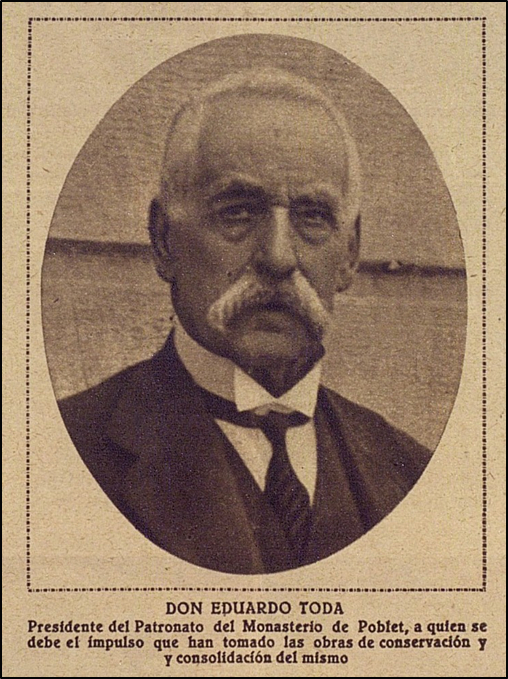Eduard Toda, de bibliòfil i mecenes de biblioteques a mestre de bugada de papers
En el setanta-cinquè aniversari de la mort d’Eduard Toda, que va ser diplomàtic, egiptòleg, escriptor i historiador, que va redescobrir i divulgar l’alguerès, que va reconstruir i restaurar Escornalbou i Poblet, que va compilar bibliografies i va ser un bibliòfil i un mecenes exemplar, s’analitza en primer lloc aquest darrer aspecte de la seva activitat que va contribuir a enriquir les biblioteques i els arxius del país. A continuació es presenta la seva relació amb l’Escola de Bibliotecàries que es va iniciar gràcies al lligam que havia establert amb la Biblioteca de Catalunya amb les seves generoses donacions de materials bibliogràfics. A partir de la documentació conservada a l’arxiu de l’antiga Escola de Bibliotecàries, es mostren les distintes facetes d’aquella relació: les excursions a Escornalbou que es complementen amb tot un recorregut cultural, les estades de les alumnes a Poblet on col·laboren en l’organització de la biblioteca pobletana, la introducció de les classes de restauració en el pla d’estudis de la carrera, la posada en marxa d’un laboratori de restauració que, per moltes dècades, compartiran l’Escola i la Biblioteca de Catalunya, etc. Certament, els vincles de Toda amb l’Escola es van caracteritzar per un afecte mutu i algunes de les activitats que va promoure amb les alumnes van contribuir a donar a l’Escola aquell toc d’ — En el septuagésimo quinto aniversario de la muerte de Eduard Toda, que fue diplomático, egiptólogo, escritor e historiador, que redescubrió y divulgó el alguerés, que reconstruyó y restauró Escornalbou y Poblet, que compiló bibliografías y fue un bibliófilo y un mecenas ejemplar, se analiza, en primer lugar, este último aspecto de su actividad que contribuyó a enriquecer las bibliotecas y los archivos del país. A continuación se presenta su relación con la Escola de Bibliotecàries que se inició gracias al vínculo que había establecido con la Biblioteca de Catalunya con sus generosas donaciones de materiales bibliográficos. A partir de la documentación conservada en el archivo de la antigua Escola de Bibliotecàries, se muestran las distintas facetas de aquella relación: las excursiones a Escornalbou que se complementan con todo un recorrido cultural, las estancias de las alumnas en Poblet, donde colaboran en la organización de la biblioteca pobletana, la introducción de las clases de restauración en el plan de estudios de la carrera, la puesta en marcha de un laboratorio de restauración que, por muchas décadas, compartirán la Escola y la Biblioteca de Catalunya, etc. Los vínculos de Toda con la Escola se caracterizaron por un afecto mutuo y algunas de las actividades que promovió con las alumnas contribuyeron a darle aquel toque de — Diplomat, Egyptologist, writer and historian, Eduard Toda is remembered as the man who rescued the Algherese dialect of Catalan from oblivion and who helped rebuild the monastery libraries of Escornalbou and Poblet. On the occasion of the seventy-fifth anniversary of his death, this paper reviews Toda’s book collecting activities, his general love of books and his outstanding work as a benefactor of libraries, which together contributed to enriching our country’s book heritage. The paper then turns to Toda’s relationship with the school for librarians the Escola de Bibliotecàries, which was founded thanks to his donation of a number of book collections to the Library of Catalonia. As recorded in the archives of the old Escola, this relationship was based on a number of different activities: Toda’s trips to Escornalbou, which also provided an opportunity for cultural study; his organization of periods of residence for student librarians at Poblet to help rebuild the monastery’s library; his creation of classes in book restoration in degree courses in librarianship; and the creation of a workshop for restoring library materials, which for many decades helped to link the Escola and the Library of Catalonia. Finally, as the article shows, Toda’s ties with the Escola de Bibliotecàries were reinforced by the mutual affection existing between him and the school as well as by the activities he organized with its students, which gave the school its singular nature as a place of study during the 1930s.


